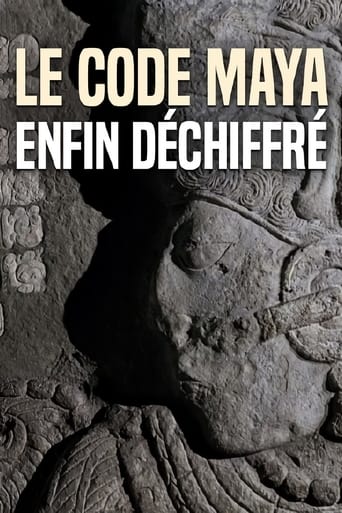tedg
If you study cinema, you need to understand visual languages. You will end up here, with a society not hampered by the need for commercial counting systems. That is what drove the written language of the "west." You will end up here for another reason. The great migration out of Africa of humans was preceded by at least a million years of language without speech. Here and Australia are where the image/gesture essentials of that language are best preserved. You'll need that if you you communicate in image.You'll end up here because this documentary is the definitive introductory film, much better than the book on which it is based because it features interviews with real experts, key players in the process. It shows the artifacts. It includes archival footage. But most of all, it shows the glyphs themselves with animated explanation. No printed description could possibly have captured that. The image language needs an image language to describe it.If you do some simple mapping from culturally situated Mayan metaphors to today's metaphors and analogies, it still lives. If you are in DC, I suggest you visit Dunbarton Oaks, mentioned here.Ted's Evaluation -- 3 of 3: Worth watching.
JamesLosAngeles
I had some knowledge that we 'cracked' the Mayan code but I had no idea that the hieroglyphs read like a book. I assumed they were more symbolic and idea-based in nature - and somehow told a general story. The reality is that they are an actual language and when deciphered can be read like a book. UNBELIEVABLE! This program is so interesting because it shows you how the code was cracked by evolving over time with different people keying in on different things. All of a sudden someone will notice something significant such as how they represent numbers and a new door is opened. The final person who puts the last piece of the puzzle together is remarkable because of his age. And because of this person's age it makes it an incredible tool to show our youth what they are capable of and that the sky is the limit no matter who you are or where you come from. We all have great gifts - most of which will go untouched. Oh, I just wish there were more interviews/footage with the actual Mayans and their reaction to the hieroglyphs being deciphered. You could tell these people were so excited to finally understand what their ancestors were actually saying - and the footage was a little 'light' here. Regardless, a must see and must for our classrooms.
TxMike
I found this on DVD at my public library. Before I watched it I didn't know much about the ancient Mayan civilization in the forests of Central America. With this film, just under an hour long, most of my ignorance was filled in. I learned that even today there remains a race that has the ancient Mayans as its ancestry, and they are making efforts to educate their peoples to preserve the Mayan language.The thrust of the presentation is how this ancient culture, once thriving and advanced, was nearly obliterated by the Spanish Christian expeditions that viewed the Mayan traditions much like "devil worship." So, misguided, they sought to destroy, by burning and other means, whatever they could. Apparently part of the destruction was untold numbers of Mayan manuscripts in their own form of hieroglyphics. ( see http://www.famsi.org/mayawriting/index.html for examples) Still, a few manuscripts survived, and have been found in modern times in various countries, well preserved. But breaking the code proved very difficult, and this program takes it step by step, profiling various famous Mayan culture researchers who contributed parts of the understanding. Interestingly a small boy who took an interest in trips with his father eventually, as a teenager, provided one of the most important modern insights into understanding the Mayan code.Overall a fascinating documentary, including many clips of the researchers themselves. Worth the time to see it, maybe even a couple of times.
